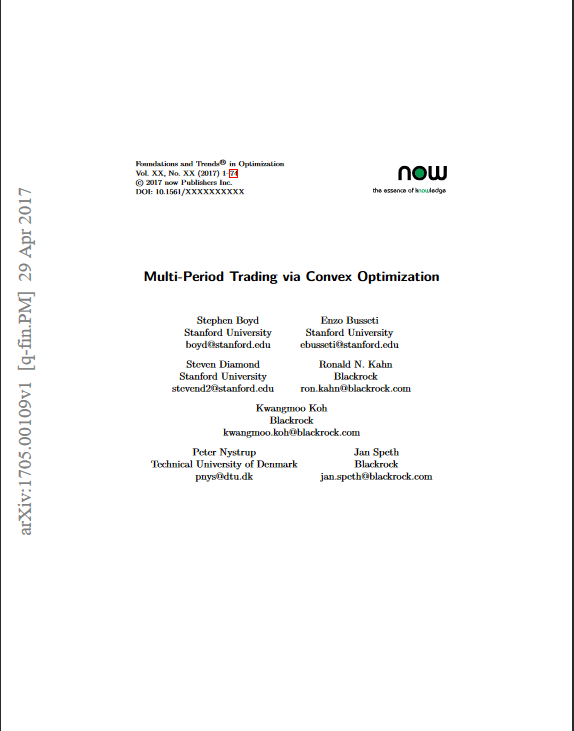موضوعات
آموزش و پرورش
ادبیات و زبان
پزشکی، دندانپزشکی و داروسازی
تاریخ و جغرافیا
داستان و رمان
دیگر
دین و فلسفه
روانشناسی
ریاضیات و آمار
سلامتی، تناسب اندام و رژیم غذایی
شیمی و پلیمر
علوم اجتماعی و حقوق
علوم زیستی و بیوتکنولوژی
فیزیک و نجوم
کامپیوتر و اینترنت
کتابهای کودکان و داستان
کسب و کار و اقتصاد
کشاورزی و دامپزشکی و غذا
معماری
مهندسی و فناوری
هنر و تئاتر
محصولات
Multi-Period Trading via Convex Optimization - Original PDF
نویسندگان: خلاصه: Our investments will be in a universe of n assets, along with an associated cash account. We let ht ∈ Rn+1 denote the portfolio (or vector of positions or holdings) at the beginning of time period t, where (ht)i is the dollar value of asset i at the beginning of time period t, with (ht)i < 0 meaning a short position in asset i, for i = 1, . . . , n. The portfolio is long-only when the asset holdings are all nonnegative, i.e., (ht)i ≥ 0 for i = 1, . . . , n. The value of (ht)n+1 is the cash balance, with (ht)n+1 < 0 meaning that money is owed (or borrowed). The dollar value for the assets is determined using the reference prices pt ∈ Rn +, defined as the average of the bid and ask prices at the beginning of time period t. When (ht)n+1 = 0, the portfolio is fully invested, meaning that we hold (or owe) zero cash, and all our holdings (long and short) are in assets. Total value, exposure, and leverage. The total value (or net asset value, NAV) vt of the portfolio, in dollars, at time t is vt = 1T ht, where 1 is the vector with all entries one. (This is not quite the amount of cash the portfolio would yield on liquidation, due to transaction costs, discussed below.) Throughout this paper we will assume that vt > 0, i.e., the total portfolio value is positive. The vectoآیا کتاب مورد نظر هنوز بر روی سایت قرار نگرفته است؟ جای نگرانی نیست! کافی است بر روی گزینه سفارش کتاب کلیک کرده و درخواست خود را ثبت کنید. در کمتر از چند ساعت کتاب شما را آماده خواهیم کرد.

